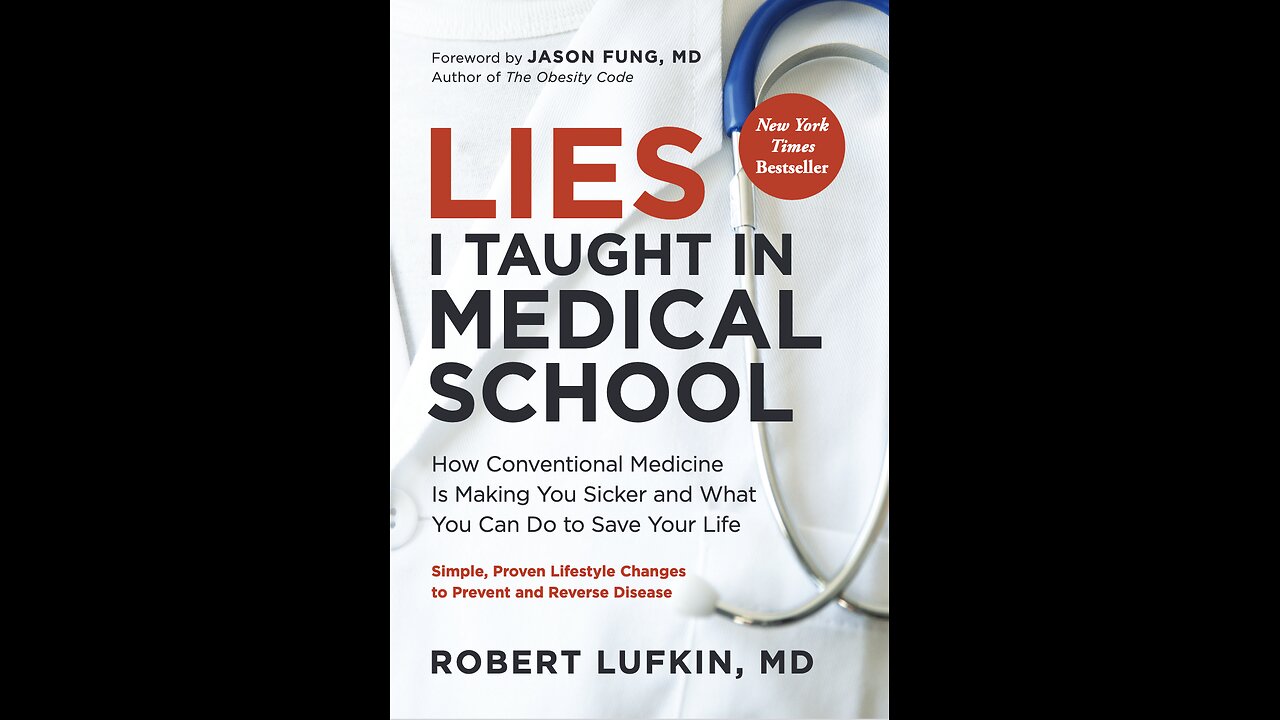Premium Only Content

Unmasking Medical Myths: Dr. Robert Lufkin’s Lies I Taught in Medical School
Western medicine, lauded as one of humanity’s greatest achievements, faces a new challenge in the 21st century: a tsunami of chronic diseases. Dr. Robert Lufkin, in his book Lies I Taught in Medical School, critiques the conventional approach to treating these conditions. He acknowledges, “Western medicine is one of our greatest scientific accomplishments, but it’s facing a new tsunami of chronic diseases.” While 20th-century medicine excels in acute care—saving lives with surgery and drugs—it often fails to address the root causes of chronic diseases like type 2 diabetes, obesity, and heart disease.
Lufkin highlights the explosion of type 2 diabetes, once a disease of adults, now increasingly found in children. “Type 2 diabetes is exploding now... this disease is now appearing in children,” he notes with concern. The traditional approach of treating it with insulin and medications, while life-saving, turns it into a chronic, progressive disease. However, Lufkin argues that through dietary changes, particularly reducing carbohydrates, many patients can reverse their condition, taking diabetes from a progressive disease to one in remission. He explains, “When we treat type 2 diabetes with diet, we can reverse the disease.”
Exercise, long hailed as the key to weight loss, is another myth Lufkin challenges. “Exercise has many health benefits, but weight loss is not one of them,” he asserts. Instead, Lufkin points to insulin as the main driver of weight gain, influenced more by diet than physical activity. He stresses the importance of lowering carbohydrate intake to control insulin levels and promote better health. Dr. Bock echoes this sentiment: “Exercise is crucial, but is it really the key to weight loss?”
The book also questions the demonization of LDL cholesterol, a central figure in the diet-heart hypothesis. “Cholesterol is fundamental in our bodies... the brain is largely cholesterol,” Lufkin emphasizes. He points out that while statins reduce heart attack risk by a marginal 1%, they may increase mortality from other causes, raising questions about their widespread use. Dr. Bock adds, “We’re burning like a fireplace... calories must go somewhere,” underscoring the complex relationship between diet and health.
Lufkin’s journey reveals that chronic diseases, much like gray hair, are almost inevitable as we age. “We need a generation of elders who can teach us and give back to society,” he reflects. But by adopting a metabolically healthy lifestyle—focusing on diet, exercise, sleep, and stress management—we can delay or even prevent these diseases. Dr. Lufkin believes the 1980s marked a turning point, with the rise of seed oils and high-fructose corn syrup, leading to an explosion in obesity and chronic illnesses. Lufkin believes the food we eat is likely the culprit, and changing our diet is the first step toward reversing this trend. As he puts it, “Something happened in the 80s, and we need to figure it out soon.”
-
 9:24
9:24
Faith Frontline
3 hours agoJordan Peterson CAUGHT OFF GUARD by George Janko’s Jesus Question
241 -
 1:18:23
1:18:23
vivafrei
3 hours agoGhislaine Quiety Moved to Texas Facility? Tish Sues Trump Over Trans E.O. Canada Madness & MORE!
70K45 -
 LIVE
LIVE
Akademiks
6 hours agoShannon Sharpe FIRED. KSOO Found Guilty! Gilbert Arenas ARRESTED! NBA Youngboy 14th kid OTW. 1/30
1,031 watching -
 2:09:16
2:09:16
Tucker Carlson
4 hours agoCandace Owens: Macron, Harvey Weinstein, and Why “Christ Is King” Totally Broke People’s Brains
100K224 -
 55:15
55:15
Michael Button
7 hours ago $0.43 earnedWhy Does This Ancient Symbol Appear Everywhere? - Archaic Lens Interview
3.63K1 -
 2:03:12
2:03:12
Side Scrollers Podcast
6 hours agoBlabs is Absolutely DISGUSTED By Nintendo | Side Scrollers Live
23.3K4 -
 10:40
10:40
MTNTOUGH Podcast w/ Dustin Diefenderfer
7 hours agoBack with the 75th Ranger Regiment: MTNTOUGH Dives Deeper into America's Elite
4.9K1 -
 1:07:23
1:07:23
SportsPicks
5 hours agoCrick's Corner: Episode 57
9.13K -
 59:32
59:32
Sean Unpaved
5 hours agoNasty Boy Unleashed: World Series Champ Rob Dibble Unloads on the MLB & Trade Deadline
33K -
 1:46:15
1:46:15
Lara Logan
15 hours agoLAWFARE UNDER FIRE: Treniss Evans Leading the Charge Against a Weaponized Justice System | Ep 29
28.5K1